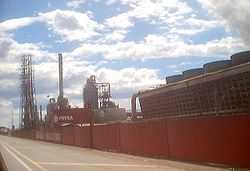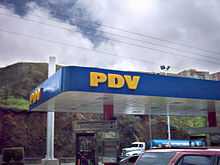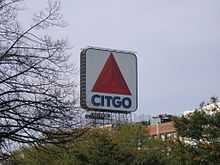PDVSA
 | |
| Type | State-owned enterprise |
|---|---|
| Industry | Oil and gas |
| Founded | 1976 |
| Headquarters | Caracas, Venezuela |
| Key people | Rafael Ramirez, President |
| Products | Fuel, natural gas and other petrochemicals |
| Revenue |
|
| Net income |
|
| Total assets |
|
| Owner(s) | Venezuelan government |
| Subsidiaries |
PDV Marina CVP Pequiven CIED PDVSA Gas PDV (Deltaven) Palmaven Electricidad de Caracas, C.A. (93.62%)[2] Citgo (100%)[3] more… |
| Website | www.pdvsa.com (Spanish) |
Petróleos de Venezuela, S.A. (PDVSA, Spanish pronunciation: [peðeˈβesa]) (Petroleum of Venezuela) is the Venezuelan state-owned oil and natural gas company. It has activities in exploration, production, refining and exporting oil, as well as exploration and production of natural gas. Since its founding on 1 January 1976 with the nationalization of the Venezuelan oil industry, PDVSA has dominated the oil industry of Venezuela, the world's fifth largest oil exporter.
Oil reserves in Venezuela are some of the largest in the world, and the state-owned PDVSA provides the government of Venezuela with substantial funding resources. The government of Venezuela treats PDVSA as a cash-cow,[4] and the company only hires political supporters of the president.[5] Between 2004 and 2010 PDVSA contributed $61.4 billion to the government's social development projects. Around half of this went directly to various Bolivarian Missions, with the remainder distributed via the National Development Fund.[6] Incompetence has led to serious inefficiencies and accidents.[7]
Reserves and capacity

Venezuela has 77.5 billion barrels (1.232×1010 m3) of conventional oil reserves according to PDVSA figures, the largest in the Western Hemisphere and making up approximately half the total. This puts Venezuela as fifth in the world in proven reserves of conventional oil. By also including an estimated 235 billion barrels (3.74×1010 m3) of tar-like extra heavy crude oil in the Orinoco Belt region, Venezuela claims to hold the largest hydrocarbon reserves in the world. Venezuela also has 150 trillion cubic feet (4.2×1012 m3) of natural gas reserves.
PDVSA has a production capacity, including the strategic associations and operating agreements, of 4 million barrels (640,000 m3) per day (600,000 m³). Officials say production is around 3.3 million barrels per day (520,000 m3/d) although most secondary sources such as OPEC and the EIA put Venezuela's output at least 500,000 barrels per day (79,000 m3/d) lower.
Politicization
In 2006, Rafael Ramírez, the energy minister, gave PDVSA workers a choice: Support President Hugo Chávez, or lose their jobs. The minister also said: "PDVSA is red [the color identified with Chávez's political party], red from top to bottom". Chávez defended Ramírez, saying that public workers should back the "revolution". He added that "PDVSA's workers are with this revolution, and those who aren't should go somewhere else. Go to Miami".[8]
PDVSA continues to hire only supporters of the president, and PDVSA revenue is used to fund political projects.[9]
History

PDVSA purchased 50% of the United States gasoline brand Citgo from Southland Corporation in 1986 and the remainder in 1990.[10]
In December 2002 the Venezuelan general strike of 2002-2003 saw many of PDVSA's managers and employees (including the CTV trade union federation) lock out workers to pressure Venezuelan president Hugo Chávez to call early elections, and virtually stop oil production for 2 months. 19,000 employees left their jobs and the government reestablished production with employees loyal to the Chávez government.
The International Labour Organization (ILO) called on the Venezuelan government to launch "an independent investigation into allegations of detention and torture", surrounding this strike. The strike caused substantial macroeconomic damage, pushing unemployment up by 5% to a peak of over 20% in March 2003. The company has since formed its own militia, which all employees join on a voluntary basis, to ward off a potential "coup" by the government. It considers itself virtually indistinguishable from the state, its social programs more or less running the country's socialist revolution.[11]
In 2005 PDVSA opened its first office in China, and announced plans to nearly triple its fleet of oil tankers, to 58.
In April and May 2005 PDVSA, per an agreement signed between the governments of Venezuela and Argentina, sent 50 million tonnes of fuel oil to the latter, in order to alleviate the effects of an energy crisis due to a shortage of natural gas.
In November 2005, PDVSA and its subsidiary in the U.S., Citgo, announced an agreement with Massachusetts to provide heating oil to low income families in Boston at a discount of 40% below market price. Similar agreements were later set up with other states and cities in the US Northeast including New York's Bronx, Maine, Rhode Island, Pennsylvania, Vermont and Delaware. Under the program, Citgo offered a total of around 50 million US gallons (190,000 m3) of heating oil at below market prices, equivalent to a discount of between 60 and 80 cents a gallon.
In February 2006 PDVSA completed ISO 9001:2000 process certification for its distribution system.
On 28 July 2006, credit ratings agency Moody's Investor Service said it was removing its standalone ratings on PDVSA because the oil company does not provide adequate operational and financial information. PDVSA has still not filed its 2004 financial results with the US Securities and Exchange Commission that were due in June 2005.
In 2007, PDVSA bought 82.14% percent of Electricidad de Caracas company from AES Corporation as part of a renationalization program. Subsequently the ownership share rose to 93.62% (December 2008).[2]
PDVSA has made contributions to the protection of the environment through showcase projects in shanty towns and waste removal.[12]
PDVSA is Latin America's third-largest company, according to the a ranking of the region's top 500 companies from Latin Business Chronicle.[13]
In 2010, PDVSA loaned the government of Antigua $68 million to repurchase all remaining shares of West Indies Oil Company (WIOC) from Bruce Rappaport's National Petroleum Ltd.[14]
In 2012, PDVSA announced that it would enter into a joint venture agreement with Eni SpA and Repsol in order to initiate a gas production project at the Cardon VI gas block in Venezuela. Production from this joint venture is estimated to reach between 80-100 million cubic meters of gas.[15]
Nationalization
Venezuela officially nationalized its oil industry on 1 January 1976, and along with it came the birth of PDVSA. See: History of the Venezuelan oil industry#Nationalization
Assets of ExxonMobil and ConocoPhillips were expropriated in 2007 after they declined to restructure their holdings in Venezuela to give PDVSA majority control, Total, Chevron, Statoil and BP agreed and retain minority interests in their Venezuelan projects.[16] Arriving at a settlement with ExxonMobil has proven difficult with Venezuela offering book value for ExxonMobil's assets and ExxonMobil asking for as much as $12 billion. This and a number of other matters including the claims of ConocoPhillips remain before the World Bank’s International Centre for Settlement of Investment Disputes.[17] PDVSA has paid compensation for assets it has nationalized including $255 million paid to ExxonMobil on February 15, 2012 in compensation for nationalization of ExxonMobil's Venezuelan assets in 2007 and $420 million to be paid beginning in 2012 to U.S. firms Williams Cos Inc. and Exterran Holdings, Inc. for natural gas assets nationalized in 2009.[18]
Safety
There have been worsening safety problems since 2003,[5] culminating in a gas leak at the Paraguaná Refinery Complex in August 2012 which caused an explosion, killing 48 people and damaging 1600 homes.[19] Another major fire broke out at the El Palito refinery in September 2012.[20]
Presidents of PDVSA
- Rafael Ramírez (2004 – current) Minister of Energy and Oil (2005), M.Sc. Energy policy – UCV, B.Sc. Mechanical Engineering – ULA.
- Alí Rodríguez Araque (2002–2004) Minister of Energy (1999), Secretary General OPEC (2001), Lic. Economics - UCV.
- Gastón Parra Luzardo (2002) Academic Vice-Rector – LUZ (1980–1984), Dean of the School of Social Sciences – LUZ (1972–1975). Lic. Economics - LUZ.
- Guaicaipuro Lameda (October 2000[21] – February 2002) Brigadier General of the Venezuelan Army.
- Héctor Ciavaldini (2000 – October 2000[21]).
- Roberto Mandini (1999).
- Luis Giusti (1994–1998) M.Sc. Petroleum Engineering – TU, B.Sc Petroleum Engineering - LUZ
- Gustavo Roosen (1992–1994) Minister of Education (1989), M.A. Comparative Law – New York University (NYU), B.A. Law – UCAB.
- Andres Sosa Pietri (1990–1992).
- Humberto Calderón Berti (1983–1984) Minister of Energy (1979–1982).
Overseas assets

- Citgo Petroleum Corporation, USA – Citgo is 100% owned by PDVSA.
- Nynäs Petroleum, Sweden – PDVSA owns a 50% stake with Finland's Neste Oil Oyj holding the other 50%.
- Bahamas Oil Refining Company (BORCO), Bahamas – PDVSA was the sole owner of this oil storage terminal in the Caribbean until April 2008. The new owners were Royal Vopak (20%) and First Reserve Corporation (80%). It is doing business as Vopak Terminal Bahamas. They in turn sold the facility to Buckeye Partners in 2011.
- Hovensa LLC refinery, US Virgin Islands – Hovensa is jointly owned by PDVSA and Hess Oil Virgin Islands Corp.
- Isla refinery, Curaçao – PDVSA leases the Isla refinery on the island.
- BOPEC, Bonaire petroleum corporation 100% owned by PDVSA.
- Ruhr Oel, Germany – PDVSA was a 50% owner of Ruhr Oel GmbH, the other half belonging to BP's German unit Aral AG. PDVSA sold its part to Russia's Rosneft on Oktober 2010.
PDVSA also has offices in Argentina, Bolivia, Brazil, Colombia, China, Cuba, Spain and Netherlands.
See also
- Petrocaribe
- History of Venezuelan Oil Industry
- Corporación Trebol Gas C.A.
Notes
- ↑ 1.0 1.1 1.2 "Fortune Global 500 2011: 66. PDVSA". Fortune Magazine. Retrieved 10 January 2012.
- ↑ 2.0 2.1
- ↑ CITGO - About us
- ↑ "Brazil’s oil boom: Filling up the future". The Economist. Retrieved 24 September 2012.
- ↑ 5.0 5.1 "Venezuela's oil industry: Up in smoke". The Economist. Retrieved 24 September 2012.
- ↑ Venezuelanalysis.com, 5 August 2010, Auditors: Venezuela’s State Oil Company Recovering from Oil Price Slump
- ↑ "Venezuela Inc., up in smoke". Globe and Mail. 17 September 2012. Retrieved 24 September 2012.
- ↑ Storm over Venezuela oil speech, BBC News,4 November 2006. Accessed online 7 November 2006.
- ↑ "Venezuela's oil industry: Up in smoke". The Economist. Retrieved 24 September 2012.
- ↑ Company History, by Citgo, accessed on 10 December 2007.
- ↑ German Zambrano, head of communications, cited in "Red Oil". Cutting Edge. 2009. http://www.mediaco-op.net/index.php?option=com_content&task=view&id=169&Itemid=131.
- ↑ "Red Oil". Cutting Edge. 2009. http://www.mediaco-op.net/index.php?option=com_content&task=view&id=169&Itemid=131.
- ↑ Largest companies in Latin América
- ↑ http://www.caribarena.com/antigua/news/latest/9368-govt-to-acquire-wioc.html
- ↑ "Venezuela’s PDVSA Delays Joint Gas Production With Eni, Repsol Until 1Q 2013". BrightWire.
- ↑ Matt Daily (February 11, 2008). "Exxon Mobil's Venezuelan gambit might lead to settlement". The New York Time. Retrieved March 26, 2012.
- ↑ "Venezuela Vows to Reject Arbitration in Exxon Case". The New York Times. Reuters. January 8, 2012. Retrieved March 26, 2012.
- ↑ "Venezuela to Pay Nationalized U.S. Firms $420 Million". Latin American Herald Tribune. March 26, 2012. Retrieved March 26, 2012.
- ↑ "Chaos, demands for answers after Venezuela refinery blast". Reuters. Retrieved 24 September 2012.
- ↑ "Venezuela : Fire at PDVSA El Palito refinery extinguished". Petroleum World. Retrieved 24 September 2012.
- ↑ 21.0 21.1 Washington Post, 27 October 2000, "Chavez Taps Into Military to Fill Top Civilian Posts; Venezuelan Leans on Familiar Source"
External links
| Wikimedia Commons has media related to PDVSA. |
| ||||||||||||||||||||||||||||||||||||||||||||||||